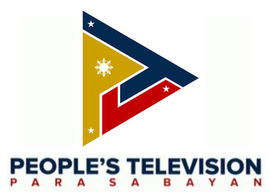

The People’s Television Network, Incorporated, traces its roots to GTV-4 (Government TV 4) created in 1974 through a Presidential Decree during the martial law regime.
It was renamed Maharlika Broadcasting System (MBS) in 1980. Following the People Power Revolution in 1986, it was renamed People’s Television 4 (PTV).
PTV-4 became a government corporation in 1992 by virtue of Republic Act 7306 signed by President Corazon C. Aquino. Its official name is People’s Television Network Inc. (PTNI). In June 1992, President Fidel V. Ramos appointed the Network’s first Board of Directors.
On 16 July 2002, under new management appointed by President Gloria Macapagal-Arroyo, PTNI adopted a new call sign, the National Broadcasting Network (NBN), in line with its re-launched programming thrusts and imaging.
As specified in its Charter, the PTNI does not receive a regular subsidy from the government. It generates revenue for its overhead operating expenses through advertising and sale of airtime. Its Charter provides an authorized capital stock of P1Billion divided into P1Million shares with par value of One Thousand Pesos per share, which shall be subscribed in full by the Government. The One Billion Pesos equity was appropriated by Congress and released to the Network from 1992 to 2008 through the General Appropriations Act.
But as specified in its Charter, the Network had to stop airing commercial advertisements since July 2001, nine years after its incorporation. To augment its operational requirements, PTNI has received government subsidies released as needed based on requests made by the Network from the National Government.
A major technological breakthrough in 1992 was the Network’s acquisition of transmitters, ENG equipment, satellite receivers, studio and lighting facilities through the 2nd and 3rd French Protocol. The transmission and production capability of the Network’s flag station, Channel 4 in Quezon City, was upgraded and the number of its provincial stations nationwide was increased.
In 1992, the Network was able to build its building and tower in Visayas Avenue, Quezon City through the support of President Corazon C. Aquino. The construction of the News Building was completed in 2005. The renovation and upgrading of the Main Transmitter Building and the construction of the Engineering and Provincial Building were completed in 2009.
The PTNI takes pride in its technological firsts – the first television network to use all-solid-state transmitters in its provincial stations with power ranging from 1 to 10kw; the first to convert its satellite transmission to digital compression; the first to use a serial digital video system in its Quezon City studios; the first to use layering technology in video production and one of the first television stations with computerized news operations in the Philippines using the Basys Computer System.
The PTNI takes pride in having pioneered in educational, cultural and children’s programming. Some of its award-winning programs were Tele-aralan ng Kakayahan, Ating Alamin, Batibot, For Art’s Sake, Coast to Coast, and Paco Park Presents. The Network made its mark in educational programming through its Continuing Education via Television (CONSTEL), a series of telecourses aimed at upgrading the content knowledge and teaching skills of elementary and secondary teachers of Science and English. These telecourses continue to be used in teacher training by the Regional and Divisional Leader Schools of the Department of Education and in Teacher Education Institutions of the Commission on Higher Education.
News and public affairs programs are the core of the Network’s programming. The news program, “Teledyaryo”, adopt the concept of a “newspaper on television” featuring segments commonly featured in newspapers.
PTNI has been the official broadcaster of major international sports competitions. It has covered the Olympic Games starting 1988 with the Seoul Olympics in South Korean missing only the 1992 Barcelona Olympics in Spain. The Network received a presidential citation from then President Fidel V. Ramos for its successful coverage of the 1996 Atlanta Olympic Games in the USA. It also covered and aired the 2000 Sydney Olympic Games in Australia and the 2004 Athens Olympics in Greece.
PTNI was the carrying station of the South East Asian Games from 1991 to 2007. It managed the International Broadcast Center (IBC) of the 1981, 1991 and the 2005 SEA Games held in Manila.
The Network has earned for itself the Hall of Fame Award from the Catholic Mass Media Award for Best Station and for Most Balanced Programming in 1999 for consistently receiving the said award for three (3) consecutive years (1987-89)
We shall inform, inspire, and empower our people and nation through relevant, trustworthy, and world-class quality television programs and services.
PTV shall be the leading news and public information channel in the country.
Professionalism, Integrity, Commitment, and Dedication
Teamwork, Innovation, and Service, Excellence
Value for God, Country and People
| POSITION | NAME |
|---|---|
| No results found | |